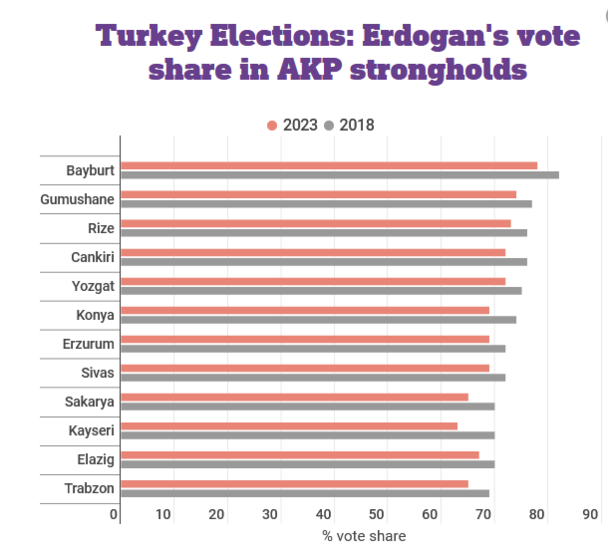Sources close to the Turkish president are confident of a victory in two weeks, saying Ogan’s vote will drift towards him and he has plenty more tricks up his sleeve
Ragip Soylu
May 15, 2023
Preliminary results for Turkey’s parliamentary and presidential elections indicate there will be a runoff for the presidency on 28 May.
Turkish President Recep Tayyip Erdogan received 49.40 percent of the votes, just short of an outright victory with 99 percent of the votes counted. His main competitor, Kemal Kilicdaroglu of the centre-left Republican People’s Party (CHP), could only get 44.96 percent.
But the real surprise was the breakaway Turkish ultranationalist contender Sinan Ogan, who got 5.2 percent of the vote.
What happens now?
One thing is certain: senior Turkish officials from Erdogan’s ruling Justice and Development Party (AKP) weren’t surprised by the results.
Despite multiple public polls indicating that Kilicdaroglu was leading and he had a slim chance of winning in the first round, the AKP’s own polls differed for weeks.
Seven polls conducted in the last month by the party showed Erdogan was leading by two to three points ahead of Kilicdaroglu, and a runoff was likely. Those estimates are now validated.
Turkish officials and sources close to Erdogan told Middle East Eye they are confident that he can easily win the runoff.
There are two main aspects of the second round that puts Erdogan at a huge advantage.
First: the parliament. Compared to the last parliamentary election in 2018, the AKP lost eight percentage of support, taking just 35.4 percent of the vote and winning 266. However, its ally the Nationalist Movement Party (MHP) only lost one percent compared to 2018, retaining 10 percent of the vote and 50 MPs. Together with the MHP, Erdogan retains his majority.
AKP officials previously told MEE they believed Erdogan retaining the majority would give him a large psychological superiority against his competitor if the presidential election was forced to a runoff. “Turkish people don’t like cohabitation,” one senior official said at the time.
They also said that they will rely on emotion in a second round, presenting Erdogan’s latest term to the public as momentous, and trying to convince the public he deserves one final victory.
But Erdogan has a second advantage: Sinan Ogan’s voters. An analysis by MEE on Sunday night based on Anadolu Agency data indicates Ogan has eaten into Erdogan’s vote share in central Anatolia.
Erdogan, for example, seems to have suffered a 5.3 percent loss in Konya, where he received 74.2 percent in 2018 but now stands at 68.9 percent. Ogan currently has 6.76 percent of the votes there.
In Kayseri, Erdogan’s vote share seems to have declined since 2018 by 6.6 percent. Here, Ogan is at 8.7 percent.
Similarly, Yozgat gave Erdogan 72.6 percent of its votes, whilst he was at 75.5 percent five years ago. Ogan has 5.7 percent. In Sivas, Erdogan is down to 69.6 percent from 72.3. Ogan is at 6.1 percent. In all these places, Kilicdaroglu’s vote share either stands at similar levels to 2018 opposition votes or seems to be 2-3 percent lower.
In all these places, Kilicdaroglu’s vote share either stands at similar levels to 2018 opposition votes or seems to be 2-3 percent lower.
This analysis suggests Erdogan voters one way or another emigrated to Ogan, probably due to economic hardships or anti-refugee feeling.
It is likely these voters will return to Erdogan’s camp in the runoff, since he most represents the Turkish nationalist side of the country in a binary choice with Kilicdaroglu.
Erdogan also has other cards up his sleeve. Unlike Kilicdaroglu, he is yet to announce his picks for vice-presidential positions. And he still has room to make a U-turn over his unorthodox monetary policy, which has been widely criticised by economists.
We remind our readers that publication of articles on our site does not mean that we agree with what is written. Our policy is to publish anything which we consider of interest, so as to assist our readers in forming their opinions. Sometimes we even publish articles with which we totally disagree, since we believe it is important for our readers to be informed on as wide a spectrum of views as possible.











